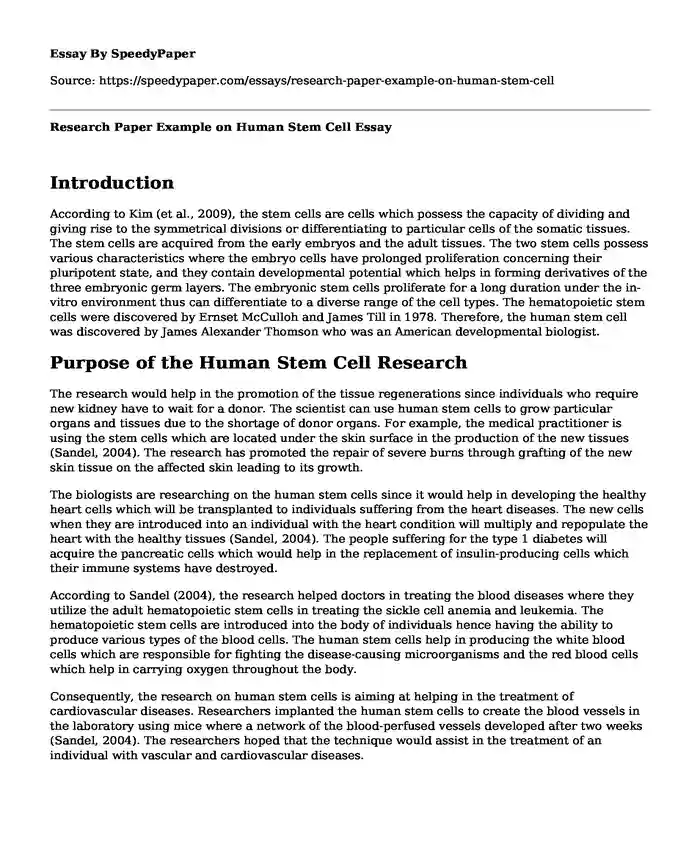Introduction
According to Kim (et al., 2009), the stem cells are cells which possess the capacity of dividing and giving rise to the symmetrical divisions or differentiating to particular cells of the somatic tissues. The stem cells are acquired from the early embryos and the adult tissues. The two stem cells possess various characteristics where the embryo cells have prolonged proliferation concerning their pluripotent state, and they contain developmental potential which helps in forming derivatives of the three embryonic germ layers. The embryonic stem cells proliferate for a long duration under the in-vitro environment thus can differentiate to a diverse range of the cell types. The hematopoietic stem cells were discovered by Ernset McCulloh and James Till in 1978. Therefore, the human stem cell was discovered by James Alexander Thomson who was an American developmental biologist.
Purpose of the Human Stem Cell Research
The research would help in the promotion of the tissue regenerations since individuals who require new kidney have to wait for a donor. The scientist can use human stem cells to grow particular organs and tissues due to the shortage of donor organs. For example, the medical practitioner is using the stem cells which are located under the skin surface in the production of the new tissues (Sandel, 2004). The research has promoted the repair of severe burns through grafting of the new skin tissue on the affected skin leading to its growth.
The biologists are researching on the human stem cells since it would help in developing the healthy heart cells which will be transplanted to individuals suffering from the heart diseases. The new cells when they are introduced into an individual with the heart condition will multiply and repopulate the heart with the healthy tissues (Sandel, 2004). The people suffering for the type 1 diabetes will acquire the pancreatic cells which would help in the replacement of insulin-producing cells which their immune systems have destroyed.
According to Sandel (2004), the research helped doctors in treating the blood diseases where they utilize the adult hematopoietic stem cells in treating the sickle cell anemia and leukemia. The hematopoietic stem cells are introduced into the body of individuals hence having the ability to produce various types of the blood cells. The human stem cells help in producing the white blood cells which are responsible for fighting the disease-causing microorganisms and the red blood cells which help in carrying oxygen throughout the body.
Consequently, the research on human stem cells is aiming at helping in the treatment of cardiovascular diseases. Researchers implanted the human stem cells to create the blood vessels in the laboratory using mice where a network of the blood-perfused vessels developed after two weeks (Sandel, 2004). The researchers hoped that the technique would assist in the treatment of an individual with vascular and cardiovascular diseases.
How the Human Stem Cell Research is Funded and its Ethical and Legal Concerns
According to Lo & Parham (2009), the federal government's National Institutes of Health and the private sector are responsible for funding the research on the Human Stem Cell. The harvesting of the Oocytes to facilitate the creation of the human embryonic stem cells raises various issues that relate to donor safety. The informed consent of the donors who give out the embryo, gametes and the recipients of the stem cell products relates to both the legal and the ethical issues.
References
Kim, J. B., Greber, B., Arauzo-Bravo, M. J., Meyer, J., Park, K. I., Zaehres, H., & Scholer, H. R. (2009). Direct reprogramming of human neural stem cells by OCT4. Nature, 461(7264), 649. Retrieved from https://f1000.com/prime/1168193
Lo, B., & Parham, L. (2009). Ethical issues in stem cell research. Endocrine reviews, 30(3), 204-213. Retrieved from https://www.ncbi.nlm.nih.gov/pmc/articles/PMC2726839/
Sandel, M. J. (2004). Embryo ethics-the moral logic of stem-cell research. The New England Journal of Medicine, 351(3), 207. Retrieved from http://www.westlaboratory.org/wp-content/uploads/2011/05/Sandel-2005-Embryo-Ethics-The-Moral-Logic-of-Stem-Cell-Research.pdf
Cite this page
Research Paper Example on Human Stem Cell. (2022, Dec 30). Retrieved from https://speedypaper.net/essays/research-paper-example-on-human-stem-cell
Request Removal
If you are the original author of this essay and no longer wish to have it published on the SpeedyPaper website, please click below to request its removal:
- Excuses for Missing Class, Free Essay in Education
- Free Essay: Is Enhanced Commonwealth the Solution to Puerto Rico's Colonial Status?
- Terrorism Essay Example
- I Am From - Personal Essay Example
- Free Essay on the Symbolism of the Black Box in the Lottery by Shirley Jackson
- Essay Sample on Preventing Food Wastage: A Solution to Food Insecurity and Its Impacts
- Essay Example on Religion and Sociology
Popular categories





